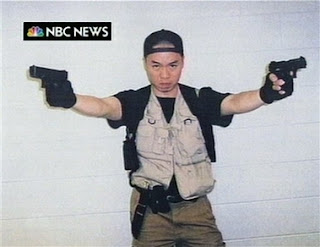The violence began around 7:15 a.m., when Cho, a 23-year-old senior and English major at Blacksburg-based Virginia Tech, shot a female freshman and a male resident assistant in a campus dormitory before fleeing the building. Police were soon on the scene; unaware of the gunman’s identity, they initially pursued the female victim’s boyfriend as a suspect in what they believed to be an isolated domestic-violence incident. However, at around 9:40 a.m., Cho, armed with a 9-millimeter handgun, a 22-caliber handgun and hundreds of rounds of ammunition, entered a classroom building, chained and locked several main doors and went from room to room shooting people. Approximately 10 minutes after the rampage began, he committed suicide. The attack left 30 people dead and another 17 wounded. In all, 27 students and five faculty members died as a result of Cho’s actions.
Two days later, on April 18, NBC News received a package of materials from Cho with a time stamp indicating he had mailed it from a Virginia post office between the first and second shooting attacks. Contained in the package were photos of a gun-wielding Cho, along with a rambling video diatribe in which he ranted about wealthy “brats,” among other topics.
In the aftermath of the massacre, authorities found no evidence that Cho, who was born in South Korea and moved to America with his family in 1992, had specifically targeted any of his victims. The public soon learned that Cho, described by ex-classmates as a loner who rarely spoke to anyone, had a history of mental-health problems. It was also revealed that angry, violent writings Cho made for certain class assignments had raised concern among some of his former professors and fellow students well before the events of April 16.
In 2011, Virginia Tech was fined by the U.S. Department of Education for failing to issue a prompt campus-wide warning after Cho shot his first two victims. School officials sent an email notification about the dorm shooting to students and faculty at 9:26 that morning. According to the Department of Education, the message was vague and did not indicate there had been a murder or that the gunman was still at large.
On April 16, 1889, Charlie Chaplin is born
Chaplin’s father died when Chaplin was a toddler, and when his mother had a nervous breakdown Chaplin and his older half-brother, Sydney, roamed London, where they danced on the streets and collected pennies in a hat. They eventually went to an orphanage and joined the Eight Lancashire Lads, a children’s dance troupe. When Chaplin was 17, he developed his comedic skills with the help of Fred Karno’s company, for which his half-brother had already become a popular comedian. Soon, Chaplin’s bowler hat, out-turned feet, mustache and walking cane became his trademark. He joined the Keystone Company and filmed Making a Living, in which he played a mustachioed villain who wore a monocle. It wasn’t long before he also worked on the other side of the camera, helping direct his 12th film and directing his 13th, Caught in the Rain, on his own.
Chaplin refined what would soon become his legacy, the character Charlie the Tramp, and signed on with the Essanay company in 1915 for $1,250 a week, plus a $10,000 bonus--quite a jump from the $175 that Keystone paid him. The next year, he signed with Mutual for $10,000 a week, plus a $150,000 bonus under a contract that required him to make 12 films annually but granted him complete creative control over the pictures. And in 1918, he signed a contract with First National for $1 million for eight films. A masterful silent film actor and pantomimist who could elicit both laughter and tears from his audiences, Chaplin resisted the arrival of sound in movies. Indeed, in his first film that featured sound (City Lights in 1931), he only used music. His first true sound film was 1940’s The Great Dictator, in which he mocked fascism.
Chaplin founded United Artists Corporation in 1919 with Mary Pickford, Douglas Fairbanks and director D.W. Griffith. Chaplin married twice more, both times to teenage girls. His fourth wife, Oona O’Neill, who was 18 when she married the 54-year-old actor, was the daughter of playwright Eugene O’Neill. Though he had lived in the United States for 42 years, Chaplin never became a U.S. citizen. A vocal pacifist, Chaplin was accused of communist ties, which he denied. Nevertheless, in 1952, immigration officials prevented Chaplin and his wife from re-entering the United States after a foreign tour. The couple did not return to the United States for 20 years; instead they settled in Switzerland with their eight children. Chaplin returned to America 1972 to accept a special Academy Award for “the incalculable effect he has had on making motion pictures the art for and of this century.” He was knighted Sir Charles Spencer Chaplin in 1975. He died two years later.



No comments:
Post a Comment